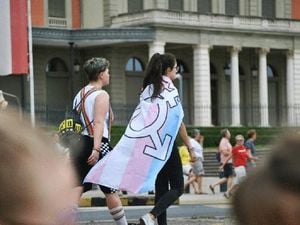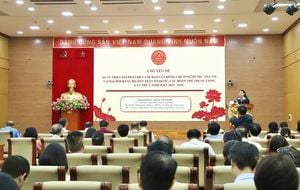When Daniela Owusu, a 20-year-old from Kirkkonummi with Finnish and Ghanaian roots, was crowned as this year’s Lucia, she expected to celebrate the tradition of light and joy. Instead, she has faced thousands of racist attacks online, highlighting the troubling reality of racism woven through Finnish society.
According to Folkhälsan, the organization behind the annual Lucia celebration, the backlash Owusu received is unprecedented. Stina Heikkilä, Folkhälsan's HR and Development Manager, explained, “The feedback has been directed at Lucia's skin color, saying it is wrong. There’s use of the n-word, comments about her not belonging to this country, and issues related to religion.”
Since Owusu's selection through public voting last November, the tone of the messages has varied but is predominantly hateful. Heikkilä noted, “We have been horrified. And it’s sad to see such negativity overshadowing what should be a festival of light.”
Incidents of racist abuse took many forms and came from various age groups, illustrating the widespread nature of the issue. Heikkilä shared, “Messages have poured in from all demographics. We certainly anticipated some backlash, but not of this magnitude.”
Owusu’s relatives and friends have also been subjected to this vitriol, receiving hateful messages alongside her. Heikkilä mentioned, “People targeted are not just Owusu, but also her family and friends, and we’re aware they've contacted police.
Folkhälsan has been proactive in addressing the situation, having reached out to the police and the Non-Discrimination Ombudsman to explore next steps. Heikkilä confirmed, “The police have already been contacted, and it’s possible more formal complaints will be made.”
Despite the alarming number of messages, Heikkilä emphasized the important support for Owusu from within the community. “We are also receiving tons of positive messages encouraging Daniela. That’s heartwarming,” she stated.
The overwhelming nature of the abuse has drawn attention to the broader public discourse on racism within Finland. Last year, the European Union Agency for Fundamental Rights released research indicating Finland is among the EU’s most racist countries, with significant portions of the Black community reporting discriminatory experiences.
“It speaks volumes about the challenges we face,” Heikkilä remarked. “43 percent of Africans interviewed reported experiencing racist harassment and discrimination, both overt and subtle, within the last year alone.”
On December 13, the day of the Lucia festivities, Owusu intends to continue with her planned appearances across various venues including nursing homes and hospitals. “We aim to carry on with the same spirit of joy and light and deliver our message of love and acceptance to the public,” Heikkilä stated.
Owusu’s role as Lucia is not just ceremonial. “I hope to inspire young people and show them anyone can be Lucia regardless of their background,” she said, affirming her commitment to represent multiculturalism within the tradition.
The Lucia tradition, celebrated annually across many Nordic countries, originates from the story of Saint Lucia of Syracuse, known for her strength and commitment to goodness during challenging times. This year’s events are believed to be especially poignant, as Owusu’s selection marks a shift from the traditional Nordic ideal, where previous Lucias typically conformed to the blonde-haired, blue-eyed image.
Indeed, Owusu’s appointment has instigated discussions about representation and the evolution of heritage celebrations. Heikkilä expressed optimism: “I truly believe there are more people celebrating this multicultural representation than those who oppose it. It’s about embracing diversity rather than resisting it.”
Despite the incidents of hate, Owusu remains resolute and optimistic. She embodies the message of light among darkness, symbolizing the potential of inclusivity and community resilience against racism.
While the racist remarks threaten to overshadow the festive spirit, the response from supporters highlights a significant willingness within Finnish society to challenge racism and embrace diversity. Heikkilä summarized the feelings within the organization: “We all feel deeply saddened and outraged. This should give us motivation to address issues of racism head-on, recognizing in these moments lies the potential for growth.”
Together, Owusu and her supporters push forward, wrestling against the waves of negativity to illuminate the true essence of the Lucia celebration, which is, after all, about hope and light flourishing amid adversity.



